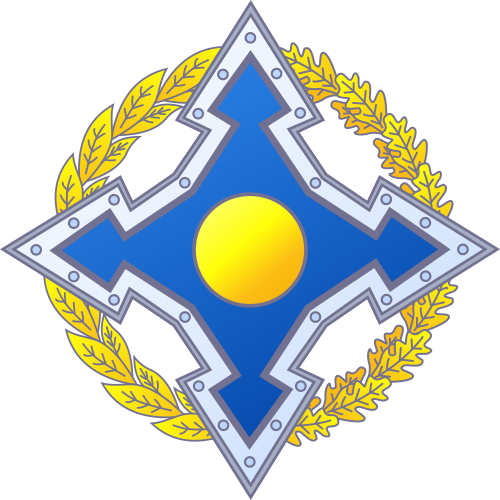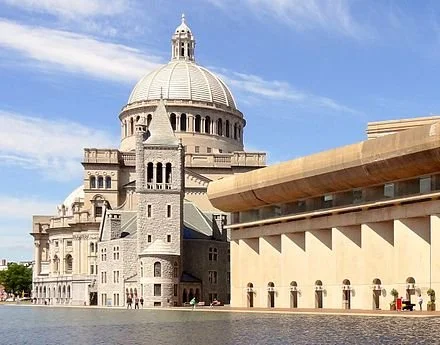
David Warsh: Meet the Putin-run CSTO; The Monitor's Fred Weir explains Russia well
Emblem of the Russia-led Collective Security Treaty Organization
SOMERVILLE, Mass.
I started writing about Russia in July, 2002, with “The Thing’s a Mess,” a glimpse of a story from the kleptomaniacal decade that followed the collapse of the USSR: how a prominent Harvard economist, his wife and two sidekicks, working in Russia on behalf of the U.S. State Department, covered by high-level friends in the Clinton administration, had been caught seeking to cut to the head of the queue to enter the country’s new mutual- fund business with a firm of their own.
This column followed the saga through the U.S. invasion of Iraq; Vladimir Putin’s objections; his brief 2008 war in former-Soviet Georgia to caution against further NATO expansion; Ukraine’s Maidan protest of 2014 and its aftermath; and the 2016 election of Donald Trump. Its little book, Because They Could: The Harvard Russia Scandal (and NATO Expansion) after Twenty-Five Years, appeared in 2018.
I still scan four daily newspapers to see what government sources are saying about Russia. I look regularly at Johnson’s Russia List, a Web-based compendium with a good eye for non-standard views. But mostly I form my views from dispatches of Fred Weir, Moscow correspondent for the Boston-based Christian Science Monitor. They are thoughtful, well-informed, and empathetic.
Last week I read three Weir articles to which I am entitled for the month (you can do the same). Why Russia’s troop surge near Ukraine may really be a message for the West made clear that the aim of large troop deployments – for the second time in a year – was to concentrate minds on Russian demands in Kyiv and the West. Russia want guarantees that Ukraine and other former Soviet states won’t join NATO as a basis for regional stability.
How the Kazakhstan crisis reveals a bigger post-Soviet problem explains the Collective Security Treaty Organization (CSTO), the six-member post-Soviet, Russian-led military alliance that intervened briefly in Kazakhstan to restore order and preserve the current poo-Moscow government. Weir wrote, “The swift and efficient injection of 2,600 troops [mostly Russian paratroopers, but contingents from Armenia, Belarus, Tajikistan, and Kyrgyzstan as well] demonstrated an unprecedented level of elite solidarity among emerging post-Soviet states, which are often depicted as allergic to Russian leadership.”
What’s in a name? For Russia’s “Putin Generation,” not as much as you’d think contrasted the experiences of Russians born in the 21st Century with those of those of their grandparents and parents. Russians born after World War II lived lives of enforced conformity and struggled to satisfy basic consumer needs, Weir writes, before the disintegration of Soviet economic life in the ‘80’s gave way to the desperate 90’s, when people reinvented themselves while struggling to survive.
Instead, this [Putin] generation, at least among those young people that the Monitor interviewed, seems to have a sense of optimism about life and a desire to reach beyond simple material security and do something to improve the world around them. That’s something relatively new in Russia.
Despite his ubiquity in their lives, Mr. Putin is not a symbol or icon to his namesake generation, many experts say, but merely a flashy pop-sociology way to demarcate them without taking into account social class, education, gender, and other critical markers.
When I was finished reading my three stories, I subscribed to The Monitor and read a fourth: Russian human rights group under threat: What soured the Kremlin? It was written before Russia’s Supreme Court shut down Memorial, a human-rights organization formed in the buoyant days of perestroika to document Soviet-era abuse, for having violated the country’s intricate “foreign agent” laws.
Weir wrote, “[M]ost experts see [the decision] as part of an accelerating campaign to close down any space for independent political action or criticism amid deepening antagonism with the West, a stagnating economy, and uncertainties about the continuing stability of Mr. Putin’s regime.”
In other words, there is still plenty of room for improvement in Russian civil society. I doubt, however, there will be war in Ukraine. Putin has made his point more forcefully than ever about the cavalier disrespect that America has shown since 1992. My sense is that he has been doing a pretty good job of putting his country back on its feet, after a surpassingly difficult century. I don’t have that feeling about Xi Jinping and China. But the situation that concerns me most is that of my own country. Bring on those mid-term elections! There is a great deal of rebuilding to begin.
xxx
Here are complementary links to a handful of especially interesting sessions at the American Economic Association meetings on Zoom earlier this month. Eight of the discussions deal with important meat-and-potatoes issues, while the ninth link connects to the hour-long lecture on preference formation, by Nathan Nunn, of Harvard University, that I found so interesting and mentioned last week.
David Warsh, a veteran columnist and an economic historian, is proprietor of Somerville-based economicprincipals.com, where this column originated.
The First Church of Christ, Scientist in Boston, with the mother church and administrative headquarters of the denomination


